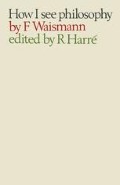Abstract
I. preliminary remarks.The writers of text-books of logic commonly take it for granted that there is a single theory, a set of rules embodying what are called the ‘laws of thought’; and that these laws are universally the same. This conception seems scarcely to accord with the present level of knowledge. For we do already possess distinct logics — if this term is used to denote precisely elaborated formalized systems: e.g., logics including or excluding a Theory of Types, systems admitting or barring the law of excluded middle, etc. Perhaps one might add that the rise of a conventionalistic mode of thinking — emanating from mathematics — today favours attempts to construct novel logics. Here two ways present themselves.
Access this chapter
Tax calculation will be finalised at checkout
Purchases are for personal use only
Preview
Unable to display preview. Download preview PDF.
Notes
For a symbolic system with a simple hierarchy of types see: F. P. Ramsey, ‘The Foundations of Mathematics’, Proc. Lond.Math. Soc., vol. 25, 1945.
For a symbolic system without a hierarchy of types see: A. Church, ‘A Set of Postulates for the Foundation of Logic’, Annals of Math., 33, 1932.
His system has been proved inconsistent by S. C. Koeene and J. B. Rosser, Annals of Math., 36, 1935.
The impossibility of a system along such lines has not been proved either. Cf. K. Gödel, ‘Russell’s Mathematical Logic’, in The Philosophy of Bertrand Russell, Evanston, 1944, p. 150.
L. E. J. Brouwer, ‘Über die Bedeutung des Satzes von ausgeschlossenen Dritten …’, J. Math., 154, 1925.
A. Heyting, ‘Die formalen Regeln der intuitionistischen Logik’, Ber. Akad Berlin, 1930. See Intuitionism, Amsterdam, 1956.
G. Birkhoff and J. V. Neumann, ‘The Logic of Quantum Mechanics’, Ann. of Math., 37, 1936.
M. Strauss, ‘Zur Begrndung der statistischen “Transformationstheorie” der Quantenphysik’, Ber. Akad., Berlin, 1936.
Author information
Authors and Affiliations
Editor information
Editors and Affiliations
Copyright information
© 1968 The Literary Executors of F. Waismann, and R. Harré
About this chapter
Cite this chapter
Waismann, F. (1968). Are There Alternative Logics?. In: Harré, R. (eds) How I See Philosophy. Palgrave Macmillan, London. https://doi.org/10.1007/978-1-349-00102-6_3
Download citation
DOI: https://doi.org/10.1007/978-1-349-00102-6_3
Publisher Name: Palgrave Macmillan, London
Print ISBN: 978-1-349-00104-0
Online ISBN: 978-1-349-00102-6
eBook Packages: Palgrave Religion & Philosophy CollectionPhilosophy and Religion (R0)

